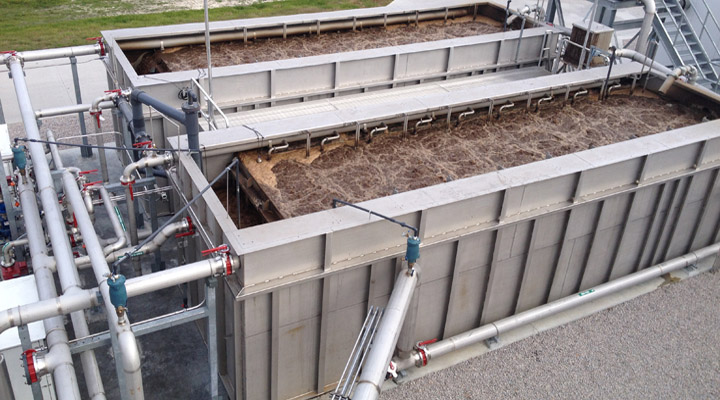ADI® Membrane Bioreactor (MBR)
See All Aerobic SystemsAn advanced activated sludge treatment system utilizing Membrane separation.
- is the minimum order quantity for this product. Please check quantity and add to cart again.
- Eliminates issues with gravity clarification
- High hydraulic and organic peak capabilities
- Superior membrane durability and performance
- Long lifetime
- Simple, infrequent cleaning procedure
- Membranes are cleaned in place
- Low operator attention requirements
- Reduces or eliminates disinfection
- Data trending for process control
- Eliminates wastewater surcharges
- Low sludge yield
- Save on chemical costs

An advanced activated sludge treatment system utilizing Membrane separation.
- Eliminates issues with gravity clarification
- High hydraulic and organic peak capabilities
- Superior membrane durability and performance
- Long lifetime
- Simple, infrequent cleaning procedure
- Membranes are cleaned in place
- Low operator attention requirements
- Reduces or eliminates disinfection
- Data trending for process control
- Eliminates wastewater surcharges
- Low sludge yield
- Save on chemical costs
Description
Evoqua's ADI® MBR is an activated sludge treatment system that improves treatment performance and consistency compared to conventional activated sludge systems by using a physical membrane barrier for liquid-solids separation instead of traditional gravity clarification. This technology complements our anaerobic technologies by aerobically polishing anaerobically pretreated wastewater, and can also be used as a stand-alone process.The MBR can treat wastewater from a wide variety of industries. The MBR system’s long solids retention time and physical membranes work together to provide more consistent removal of organics, ammonia, and nitrogen than conventional activated sludge systems. The biochemical oxygen demand (BOD) and total suspended solids (TSS) concentrations discharged from the process are negligible, and very low effluent phosphorus concentrations can also be reached.
- Produces a very high-quality effluent
- Can meet strict discharge limits for BOD, TSS, nitrogen, and
- osphorus
- Suitable for water reuse or direct discharge
- Small footprint
- Operates at high mixed liquor suspended solids concentrations (8,000 – 15,000 mg/l)
- Long solids retention time
- Increased stability against changes in influent characteristics
• Membrane barrier ensures complete solids retention and process stability
MBR Benefits
Costing Savings
- Eliminate wastewater surcharges
- Reduce sludge handling and disposal costs
- Low sludge yield
- Save on chemical costs
- Reduce nutrient requirements
• Eliminate polymer usage
• Reuse water in plant operations
Environmental Benefits
- Can meet strict discharge limits for BOD, TSS,T261 nitrogen, and phosphorus
- Produces a very high-quality effluentOperates at high mixed liquor suspended solids concentrations (8,000 – 15,000 mg/l)
- Long solids retention time
- Increased stability against changes in influent characteristics
- Membrane barrier ensures complete solids retention and process stability
- Eliminates issues with gravity clarification
• High hydraulic and organic peak capabilities
• Suitable for water reuse, improves plant’s water security
• Suitable for direct discharge
• Small footprint
Process Advantages
- Operates at high mixed liquor suspended solids concentrations (8,000 – 15,000 mg/l)
- Long solids retention time
- Increased stability against changes in influent characteristics
- Membrane barrier ensures complete solids retention and process stability
- Eliminates issues with gravity clarification
- High hydraulic and organic peak capabilities
Simplified Operation & Maintenance
- Superior membrane durability and performance with low maintenance
- Long lifetime
- Simple, infrequent cleaning procedure
- Membranes are cleaned in place
- Low operator attention requirements
- Reduces or eliminates disinfection
- Data trending for process control
Specs
- Activated Sludge
